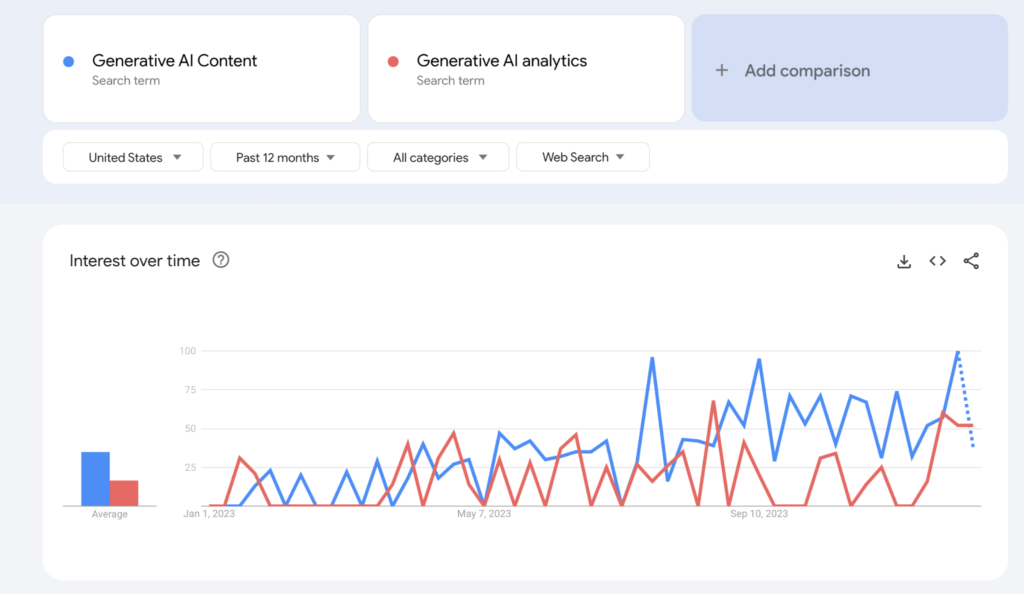As interest in MarTech artificial intelligence technologies continues to accelerate, many businesses have focused narrowly on generative content creation without equal investment in analytics. Google Search Trends paints this picture with December 27th 2023 search data: the Google search term “Generative AI Content” yielded two times that of “Generative AI analytics.” However, to fully optimize the performance potential of AI, organizations must take a balanced approach that pairs generative content with rigorous optimization powered by generative business intelligence (BI).

Savvy marketing leaders realize that creativity must be informed by analytical guidance. Generative analytics provides the intelligence to determine what content will drive engagement, conversion, and ROI. Without generative analytics, organizations lack the feedback loops to systematically improve the output of content. While generative AI tools can rapidly produce high-quality, customized content at scale, predictive modeling for creative performance can provide a higher return on investment. Predictive modeling based on historical return on ad spend (ROAS) data ensures future content resonates with target audiences without running another lengthy A/B test. So why does interest in generative AI analytics lag behind generative AI content when the business impact of generative BI is so clear?
The real issue is not that marketers are unwilling to adopt AI, but rather that they need help learning how to implement and utilize AI technologies effectively. A recent Marketing Institute of AI study noted that 64% of respondents listed “a lack of education and training” as their biggest barrier to AI adoption. Marketing agencies are in the perfect position to provide this education to the broader market. They have the right expertise to support clients, they’re at the forefront of new AI technology, and they’re built to scale with fewer people. One immediate use case comes to mind: improving paid media advertising testing for agency clients.
Testing a multitude of ad creative combinations at scale strains even the savviest performance marketing teams. Exhaustive experimentation isn’t scalable— burning ever-shrinking paid-spend budgets while prolonging the path to peak profitability. Luckily, generative business intelligence can optimize this process. Machine learning models provide a shortcut to higher ROAS by detecting the historical correlations between specific creative elements and business outcomes. These could include visual executions, emotionally resonant messaging, offer framing, or countless other creative elements influencing audience response.
Once sufficient campaign data is captured, predictive algorithms get straight to work. They rapidly surface the highest-performing components and simulate new permutations likely to outshine past results. The upside potential of each modification is clearly quantified before deployment based on probability— no more flying blind and hoping for the best.
Ongoing optimization powered by predictive modeling becomes a virtuous cycle. As new ad data flows in, recommendations grow more precise through continuous self-tuning. Media buys scale efficiently by zeroing in on scientifically selected message-creative combinations to attract, engage, and convert each target demographic.
Agencies that leverage predictive analytics to inform clients’ ad creative direction unlock a perennial wellspring of leveraged knowledge. Moving forward, ad strategy is dictated not by assumptions but by an empirical compass needle pointing to maximum ROAS. Intuition now has a mighty data-driven co-pilot for navigating decisions. This hybrid approach marries the art and science of marketing to drive superior campaign performance.
Companies that bring together simplified generative business analytics with scalable generative content creation will maximize ROI. In 2024 and beyond, the martech winners will be those organizations that implement this integrated AI strategy. Unlocking both exponential content creation and optimization intelligence propels superior marketing results.
For more such updates, follow us on Google News Martech News
ABOUT THE AUTHOR


Julia Dunlea, VP of Marketing at Akkio
Julia Dunlea is the VP of Marketing at Akkio, a pioneer in generative AI and predictive modeling for agencies looking to deliver impactful and strategic results to their clients. She has 12+ years of experience in digital marketing, product marketing and go to market strategy for the B2B technology companies.




